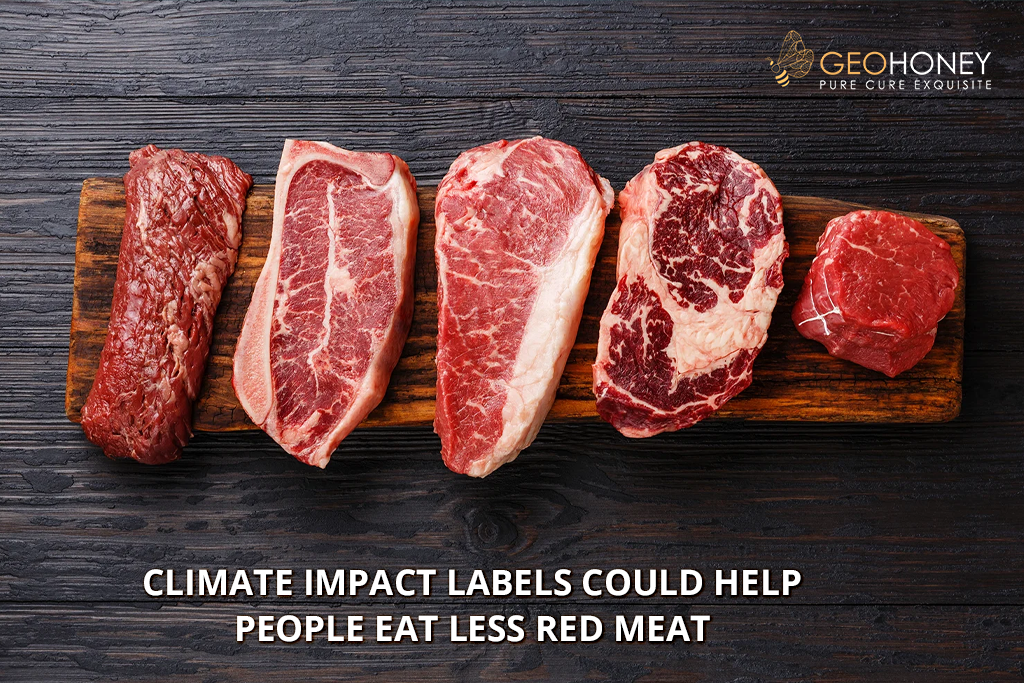- Tokyo: 20:10
- Singapore: 19:10
- Dubai: 15:10
- London: 11:10
- New York: 06:10
Climate impact labels could help people eat less red meat

A study has found that Climate impact labels on foods such as red meat are an effective way to get people to stop choosing options that negatively affect the planet
Policymakers have been debating on how to discourage people from choosing heavy carbon food options. Even the Intergovernmental Panel on Climate Change (IPCC) report had urged world leaders to support a transition to sustainable, healthy, low-emissions diets.
In the UK, Henry Dimbleby, the food tsar, recently said it was politically impossible for a government to tell people to stop eating as much meat. About 85% of agricultural land in England is used as grazing pasture for animals or to grow fodder to feed livestock. Dimbleby believes that 30% meat reduction over 10 years is required for land to be used sustainably in England, while Greenpeace argues for a 70% reduction.
A recent clinical trial suggest that consumers respond well to climate labelling on their foods. Participants in the study were shown a fast food menu and were asked to select one item that they would like to order for dinner. Participants were randomized to view menus with one of three labels: a quick response code label on all items (control group); green low–climate impact label on chicken, fish or vegetarian items (positive framing); or red high–climate impact label on red meat items (negative framing).
The low–climate impact condition menu stated: “This item is environmentally sustainable. It has low greenhouse gas emissions and a low contribution to climate change.” The high–climate impact condition menu said: “This item is not environmentally sustainable. It has high greenhouse gas emissions and a high contribution to climate change.”
On comparing the participants in controlled group, it was found that 23.5 % more participants selected the environmentally sustainable items when menu label displayed high–climate impact and 9.9% more participants selected the environmentally sustainable items when menu label displayed low–climate impact. Along with this the participants who ordered sustainable items rated their order healthier than those who selected the non-sustainable order.
The Study authors from John Hopkins and Harvard Universities states that Animal-based food production, primarily driven by beef production, is responsible for 14.5% of global greenhouse gas emissions and is an important modifiable contributor to climate change.
In the United States, particularly red meat consumption, consistently exceeds recommended levels based on national dietary guidelines. Shifting the current dietary patterns towards more sustainable diets with lower amount of red meat consumed could reduce diet-related greenhouse gas emissions by up to 55%.”
The authors said that labelling red meat items with negatively framed or red high–climate impact labels was more effective at increasing sustainable selections than labelling non–red meat items with positively framed or green low–climate impact labels.
They found that telling people that a food type had negative environmental impacts was more effective than informing them that a food was a more sustainable choice.




I guess this red meat is making the planet sick.
The truth is that animal farming causes a lot of damage to our environment.
Because eating less meat is a way to reduce green house emissions that contribute to climate change.
Eating less meat helps the environment because it lowers the demand for meat products, and in turn reduces land use.
Eating less meat means eating foods that are plant-based rather than those that are animal-based.
Eating less meat can help reduce pressure on forests.
Looking at the adverse effects of consuming meat and other non-vegetarian stuffs, I had decided to become totally vegetarian.